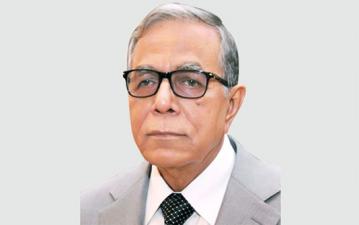Play due role for solution to Rohingya crisis

President Abdul Hamid on Thursday urged the international community to play its due role in solving the protracted Rohingya problem.
He made the call at a programme titled 'The Hardening of International Relations: A Risk to Peace and Security' at the official opening session of the 20th annual session of Home and Global Security Forum held at Grand Hotel Kempeinski of Geneva, Switzerland, reports UNB.
"I urge the international community to play its due role, including at UN Security Council, to end the Rohingya problem," the President said.
Global problem requires global solution, he said adding, "I take, this opportunity to raise the case of the Rohingya Muslims of Myanmar which may be considered as an acid test for the global community to collectively deal with an international problem and a test case for any future international cooperation on peace and security."
The President went on saying, "Rohingya Muslims of Myanmar are world's most persecuted population. We all are appalled by what we have seen in the UN Reports about the horrifying atrocities committed against them which tantamount to genocide and crimes against humanity."
He mentioned that 1.1 million Rohingyas have taken shelter in Bangladesh and the government is trying its best to provide food, shelter, clothing, healthcare, childcare and above all the sense of security to them.
Hamid mentioned that Prime Minister presented 5-point proposal last year and 3-point proposal this year at the UNGA seeking a sustainable solution to the Rohingya problem.
Thanking the states and the international organisations which provided assistance, the President said the main requirement along with economic and logistic support is the political will of all states, especially the states which can influence and facilitate the process of repatriation and establish sustainable peace and security inside Myanmar for the repatriated Rohingyas.
Seeking cooperation during this challenging time, Hamid said, "The world needs cooperation most and unity of purpose to address the threats posed by different actions or inactions. It is evident that states can no longer afford to deal with such challenges in an isolated manner or ignore the full range of their impacts - whether it is social, political, environmental or economic."
Problems arising out of detachment policies and polarisation cannot be solved by the very process of eccentric attitude, he said.
"I would like to remember our Father of the Nation Bangabandhu Sheikh Mujibur Rahman who declared the dictum of our foreign policy after our independence, 'friendship to all, malice towards none'," he said.
"As repeatedly manifested in history, the only way to take on global and local challenges is by working collectively so either we figure out ways of winning together, or together we lose everything."
Stressing the preparation for feeding more than 9 billion people by 2050, the President said, "We aren't yet prepared for that. Malnutrition and hunger are still ruling in many parts of the world.
Then comes the issue of sustainable economic growth for everybody as in spite of growth of the global GDP, income and wealth disparity is stark within and among nations.
The President also called for the concerted efforts of all the countries facing new security threats like cyber-attacks.
President of Armenia Armen Sarkissian, former President of Montenegro Filip Vujanovic, Prime Minister of Congo Tshibala Nzenzhe, Prime Minister of Lesotho Thomas Motsoachae Thabane, 130th President of the Generalit at of Catalonia Carles Puigdemont Forestry and Research Minister of Soloman Island Samuel Manetoali, co-founder of public international law and policy and policy group of United State Paul Williams spoke at the official opening session.
Chairman and founder of Crans Montaan Forum Jean-Paul Carteron presided over the session.
